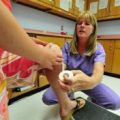
This post was written by Marcos Contreras, a former member of our team.
I recently became Mental Health First Aid certified. The first thing I did after the class ended was to walk from the classroom to the front lobby of Mental Health Center of Denver and ask about counseling services. In a Mental Health First Aid course, you learn signs and symptoms of a mental health challenge or crisis, what to do in an emergency, and where to get help for others in need. However, the most important lesson I took away from the training was to be an advocate for my own mental health.
I had been experiencing persistent feelings of anxiety, sadness, and guilt over the last couple of weeks. But, I wanted to be resilient and carry the burden on my own, so I avoided seeking professional help. Despite having a college degree in psychology, I could not escape the statistic that only 7% of Hispanic adults in the U.S. utilize mental health services in a given year, a startling contrast compared to white adults’ utilization of services at 17%.
To make matters worse, the 2017 Colorado Health Access Survey (CHAS) reports the uninsured rate among Hispanics is 10%, double the 5% uninsured rate of non-Hispanic white Coloradans. The report details that of the Coloradans that did not seek needed mental health services in the past year, 72% said it was because they were uninsured, 56% because they were concerned about the cost, and 43% because they thought their insurance would not cover it—although most insurance plans are required to cover mental health services. These challenges are complex, and the need for adequate, culturally-responsive mental health care is only growing.
In 2015, 10% of Coloradans reported having poor mental health, which is defined as eight or more days of poor mental health in one month, and in 2017, it was up to 12%. Those needs are going unmet: one in 13 Coloradans (8%) and one in six Medicaid patients (15%) did not get the mental health services they needed.
When we say we want our health care system to work for all Coloradans, regardless of their race, income, and ZIP code, we include mental health in that vision. That is why this past legislative session, we supported the passage of bills like SB18-024, which will expand access to behavioral health care providers in shortage areas around the state, and SB18-20, which expanded the range of psychotherapists who can perform AcuDetox, or five-point ear acupuncture, to combat substance use disorders and help turn the tide of the opioid epidemic. There are commonsense solutions to these complex challenges, and when we pursue them, we get closer to ensuring our mental health care system works for everyone.
To make sure that the mental health care system worked for me, I had to realize that I was unnecessarily carrying this heavy burden of mental anguish on my own. I had to realize that it was okay to ask for help, that it was not an innate flaw in my character, a weakness in my resolve, or in any way a deficiency in who I am.
I am one of the 15% of Hispanic adults who have experienced mental illness in the past year, but thankfully I now also belong to the 7% that sought professional help. I credit Mental Health First Aid for helping me recognize the signs of the mental health challenges I was facing, but also for preparing me with a practical set of tools and skills to help others within my family, community, and workplace. I encourage everyone to enroll in one of the Mental Health First Aid classes offered every day, in both Spanish and English, across Colorado. There are now over 50,000 Mental Health First Aid-ers in Colorado, the highest per capita in the country, and I'd love to see that number grow!




